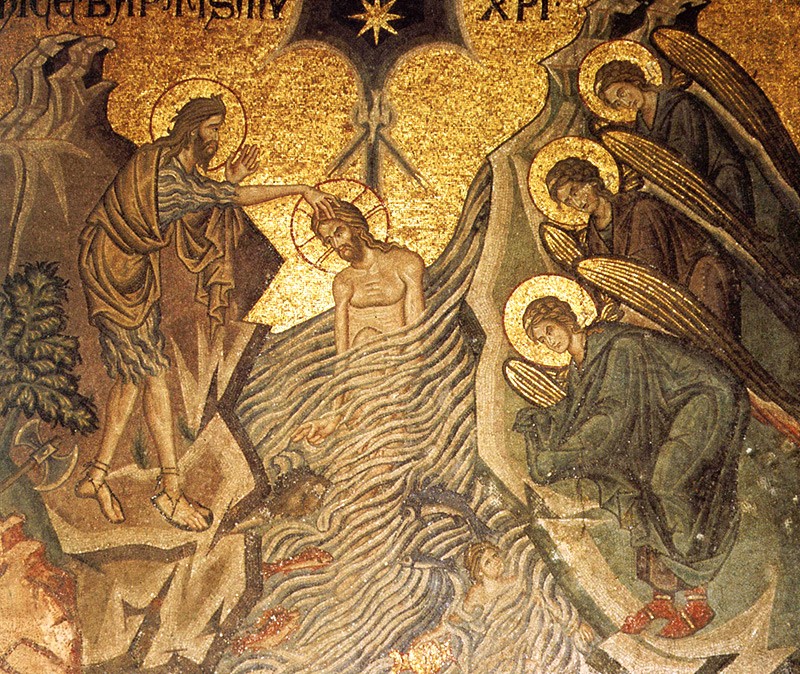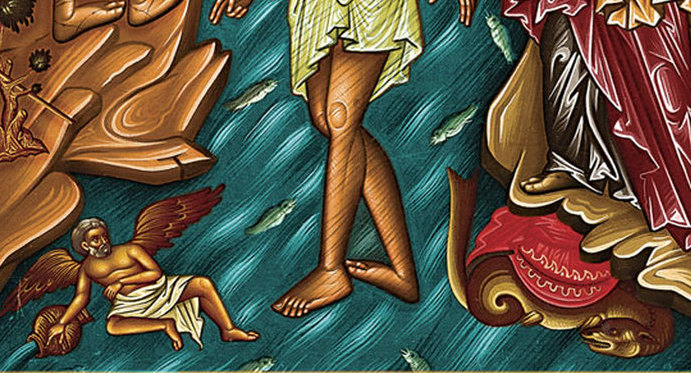
Acts 19:1-8
Troparion of Theophany
John 1:29-34
In our feast and next-day synaxis, we proclaim that God the Son has manifested Himself to humankind. In this, we hear an echo of the Father's own self-revelation: "I am the Lord thy God" (Ex 20:2). And where God is revealed, His savings acts are always recalled: "who brought you out of the land of Egypt, out of the house of bondage" (Ibid). Towering above all His savings acts, of course, is the Creation itself:
|
Praise him, sun and moon,
praise him, all you shining stars! Praise him, you highest heavens, and you waters above the heavens! Let them praise the name of the Lord! For he commanded and they were created. (Ps 148) |
|
The earth was without form and void, and darkness was upon the face of the deep;
and the Spirit of God was moving over the face of the waters. (Gen 1:2) |
| "Can you draw out Levi'athan with a fishhook, or press down his tongue with a cord?" (Job 41:1) |
|
In that day the Lord with his hard and great and strong sword
will punish Levi'athan the fleeing serpent, Levi'athan the twisting serpent, and he will slay the dragon that is in the sea. (Isa 27:1) |
|
And the Lord will utterly destroy the tongue of the sea of Egypt;
and will wave his hand over the River with his scorching wind, and smite it into seven channels that men may cross dryshod. (Isa 11:15) |
We misunderstand the Great Flood of Noah's time if we view it as a deadly force unleashed by God. No. God does not send the Flood as a sorcerer utters a curse. Rather, He steps back from the scene together with His ceaseless presence of blessing and safekeeping. For the earth is always tending toward chaos. (This is an imperative of modern physics). It is God alone Who stands between us and planetary, not to say personal, destruction.
The furthest extreme from the all-destroying chaos of the sea, witnessed by Noah and his family, of course, is Eden, a state of life that betokens complete order, which we call harmony. Harmony on the earth, and harmony between the earth and Heaven, where man conversed with God in the cool of the day (Gen 3:8).
The opposite principle from Eden, spiritually speaking, is Hell. For demonic power is essentially destructive always attempting to lead well-ordered lives and families into chaos. And we must not forget that our Greek word for chaos, pandemonium, means "all demons." Hell to one extreme, Eden to the other, and water as the great medium between the two, as changeable as the sea itself.
What is salvation, then? What is the fullness of divinity with the human person? What is perfect union with God? It is Eden, the state of complete sanctification and the end point of our spiritual journey to God.
If God were to send a Forerunner to announce a return to goodness and to union with Him, what would he look like? What appearance must he have, what tone must he sound in order to ring true? He would be a man from Eden. And he was.
Just being near to him one could detect a faint fragrance, a strangely familiar scent, stored in the deepest recesses of our racial memory. It was a goodly scent pouring balm upon the spirit and enlivening the cells within. It was the scent of Eden's sweet air. Among those who saw St. John the Forerunner, who could doubt the country from whence he came? Dressed only in natural clothing, having no spot of the corrupt city life upon him, eating the perfect food of honey cakes called manna, he was the man from Eden.
As the Greek word for this manna, ενκρις (enkris), sounds very much like the Greek for locust ακρις (akris), we have been handed the ridiculous image of this vegetarian from Eden preying upon insects!
Who could possibly be a more perfect image of preserved Israel than this man of Eden? The preservation of pure humanity. Preserved, like a creature from a prehistoric time, frozen in clear amber, perfect in every detail: St. John the Forerunner. As we read in Psalm 81:
|
"O that my people would listen to me,
that Israel would walk in my ways! I would feed you with the finest of the wheat, and with honey from the rock I would satisfy you." |
As any pure man or woman would, John was exquisitely sensitive to impurity. Have you ever given up smoking? Then you know how offensive cigarette smoke is to one who is cleansed of it. Have you ever given up drinking? Then you know how offensive is the crude and foolish conduct of a drunk when you no longer have any part in that world. Likewise, John's body and soul were ever fresh and new. The pink flesh of his heart was a heart like unto God's. Unholy things that people had come to accept in themselves were unacceptable to him as they are unacceptable to our holy God. Yet, John's heart, like God's, was full of compassion for the people. "Wash away the corruption that sucks the life out of you!" in effect, he told them. "Return to God! The salvation of God draws near to you! Prepare the way! Prepare!"
Within his mother's womb, John leapt with the approach of the new Eve. As St. Justin Martyr (Dialogue with Trypho, C) and St. Irenaeus (Against Heresies, III, 22) have commented, Mary was the obedient Eve, the one who would crush the serpent's head. Together Mary and Elizabeth would usher in the end of our exile from Eden pointing ahead to the one who was Eden, the restoration of God's Image upon humanity.
It is a wonder that we can only faintly grasp all of this today. We do not see the pristine and pure John, the natural man of Eden, which first-century Judeans saw so clearly. We have been too much exposed to the "mountain man" depictions of John the Baptist and disgusted by the (false) report of his insect diet. Our American ears, hearing the word wilderness, picture a forbidding landscape, a dangerous place, the great Northwest with its timber wolves, mountain lions, and grizzly bears, and rocky precipices and crags.
But the Greek word used in St Mark's Gospel ("one crying in the wilderness") or St. Luke's Gospel, as we read this morning, is ερημω. It means solitary, as in the place where we meet with God, as Moses did in Midian or as God's people did at the foot of Mt. Sinai. ερημω means uninhabited like the one place on earth where no human may enter. And where is this uninhabited place? It is Eden, guarded by angels, set apart for those who would reclaim their unity with God.
We have watched too many Hollywood movies, where John's baptism is seen in the background as a marginal event, depicted to one side of the main action. We have missed the epic scale of this phenomenon. But those living during the first century in Palestine did not. On the contrary, they saw a tsunami that swept over the whole Levant. The Gospels report that everyone participated in it.
|
And there went out to him all the country of Judea, and all the people of Jerusalem;
and they were baptized by him in the river Jordan, confessing their sins. (Mk 1:5) |
|
As it is written in Isaiah the prophet,
"Behold, I send my messenger before thy face, who shall prepare thy way; the voice of one crying in the wilderness: Prepare the way of the Lord, make his paths straight ... " |

St. Peter compared the Forerunner's ministry of baptism to a Noah's Flood (1 Peter 3:20-21). And he intended that analogy with all its lethal force. After all, only eight good persons survived from numberless masses inhabiting the earth. The world is under a constant threat of destruction; it is God alone Who has the power to save.
Consider the icons that have come down to us of the Lord's baptism. On one side, we see the fallen world, blasted and broken where the Forerunner labors to lead people out of sinful life; on the other, the domain of angels, Eden. In the midst stands the One Who has power to command the wind and the sea. He stands in the waters of chaos, where we see depicted Leviathan, pagan gods, and rampant fish, expressing shock at God's power over their erstwhile realm of destruction.
We have lost the urgency of this.
The Forerunner does not point to some distant or vague event.
He points to the now of lives in chaos,
to the now of spiritual destruction and death,
and to the forever of life
—
amongst angels or amongst demons.
He cries in the wilderness.
He cries to us.
In the Name of the Father and of the Son and of the Holy Ghost.
Amen.